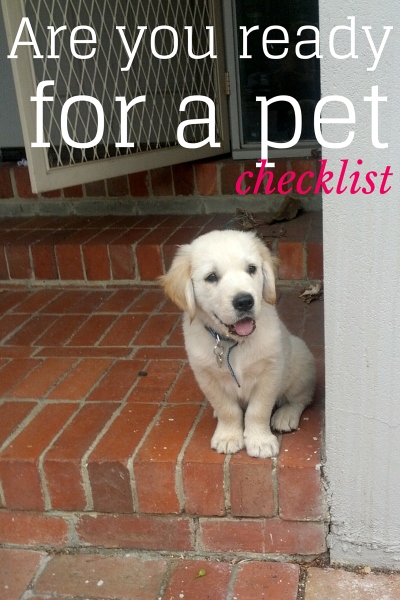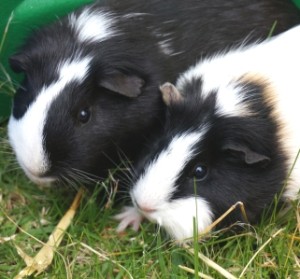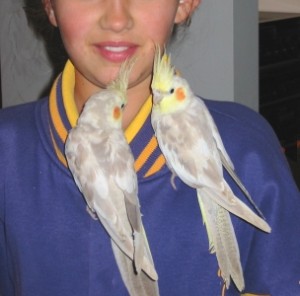 So Are Ready For A Pet?
So Are Ready For A Pet?
Choosing a pet is a huge commitment and one that should never be taken lightly. Any pet, no matter how big or small, requires a certain level of daily commitment that is ongoing for the duration of it’s life.
It is not only dogs and cats that end up in shelters, but rabbits and guinea pigs are also abandoned to shelters in the thousands each year. Many people think rabbits and guinea pigs are an easier, cute, low maintenance pet, but they soon realize this is not the case.
This article will help you decide first, if you and your family are truly ready for a pet and secondly, which pet would suit you and your family best.
Before I go any further, I urge you to adopt your pets from shelters and rescue groups, rather than buy from breeders and absolutely never buy dogs, cats, rabbits, guinea pigs and birds from pet shops.
While pet ownership is a wonderful experience and there have been countless studies done on showing the positive health benefits of owning a furry, feathered or scaled companion, there are many things to consider before you bring home a new family member.
Here is my simple checklist designed to help you decide if you are really ready to commit to owning a pet.
The Am I Ready For A Pet Checklist
1. Are you allowed pets where you live?
2. Are you planning to move in the period of years you will possibly own this pet and if so can you take your pet with you?
3. If you can’t take your pet are you willing to go to the effort of finding a new loving home for your pet and not just give it up to a pound or shelter?
4. Does anyone in your house have allergies, asthma, or a compromised immune system? If so first visit an allergist to determine what pets will be safe for them to live with.
5. If you develop an allergy to your pet would you be willing to live with it and if not would you be willing to go to the trouble of finding it a new loving home and not abandoning it to a shelter or worse having it put down?
6. Are you willing to pet proof both your house and garden; e.g. is your garden securely gated and fenced, removing any plants that may be poisonous to your pet.
7. Can you afford a pet? This includes not only food but will you be able to afford to pay for medical treatments and emergencies? Some pet surgeries can easily cost a few thousand dollars..
8. Are you able to provide a pet with it’s daily needs? This includes being able to walk your dog each day, play with your cat, take your rabbits, guinea pigs, rats and birds out of their cages and hutches each day for an hour of exercise?
9. Where will your pet stay when you go away on holidays?
10. Are you or someone else in the family realistically home enough each day to give your pet enough company? If not and you have your heart set on having a pet, then in the best interests of the animal you should get them a playmate. Dogs, birds, rabbits and guinea pigs are all pack animals and hate to be alone. Often destructive and unwanted behaviours are a result of bored and lonely pets.
11. If you want a pet and your partner doesn’t, will they still help take care of your pet if you are unable to some days? This is important to discuss and be able to come to some sort of arrangement before you bring a pet home. If you travel for work or are sick for a few days and your partner hates your pet and flat out refuses to walk, feed or clean their cage or hutch, then you and your pet have a problem.
12. If your pet turns our to have behavioral problems (please note we are not talking about aggression issues, this is a serious issue and must be dealt with by a professional) and is difficult to manage, will you invest the time into training and helping them? Many dogs for instance get surrendered up to pounds because of incessant barking or destructive behaviour or toileting in the house.
What Pet Should I Get?
Choosing the right type of pet for you and your family is very important and something you want to get right. Below is a brief outline of the daily and weekly needs of different types of animals people commonly choose to have as pets.
Dogs As Pets
 Average Lifespan 10-13 years.
Average Lifespan 10-13 years.
Needs
- Lot’s of love and attention daily.
- Being allowed inside with your family if a single dog, as you are his pack.
- Feeding once or twice daily.
- Play time with safe dog toys.
- Yearly vet checks and vaccinations. Monthly worming treatments.
- Daily walking or off-leash exercising in a secure dog park, minimum 30 minutes for small dog, or approximately an hour for a very active medium to large dog. If you adopt a working dog breeds e.g, kelpies, blue heelers, border collies etc. these dogs often need more exercising and stimulation that other breeds and that means even more exercising; e.g. a decent hour walk or run and then regular daily stimulating exercises such as ball fetching.
- A safe outdoor area including a kennel, shaded protected area to rest in garden, supply to fresh water.
- Indoors a safe private bed area, that is his own spot to go to for rest and when he needs alone time.
- Daily or weekly brushing for long haired dogs.
- Be sure to adopt a breed that suits the energy levels in your household. See our article – How To Choose The Right Dog For Your Family – What You May Not Have Thought About When Deciding To Get A Dog.
If you have young children and you are considering adopting a dog please first read my articles Kids and Dogs Living Together Safely and Safety With Kids And Dogs -by Belinda Kelly of THE PAWFECTIONIST and Teaching Kids How To Behave Around Dogs
Cats As Pets
 Average Lifespan 12-14 years.
Average Lifespan 12-14 years.
Needs
- Lot’s of love and attention each and every day.
- Providing stimulating fun cat games, scratching post and cat safe toys.
- Yearly vet checks and vaccinations. Monthly worming treatments.
- Once or twice daily feeding.
- Either kept indoors, or outdoors during the day time only, in a secure, escape cat-proof backyard or enclosure, which offers a shaded area and fresh water; read Letting Cats Outside To Roam Is Dangerous.
- Indoors you must provide your feline friend with a cat litter tray, which is cleaned out daily and completely replaced every few days with fresh clean litter.
- Daily or weekly brushing is required if you adopt a long haired cat. Read my article Cats Health Tips.
Cats indoors must be kept safely away from young babies and toddlers cots and bedrooms, as there is a real danger of them sleeping on top of your infant and the results can be tragic.
Rabbits As Pets
 Average Lifespan 8-12 years.
Average Lifespan 8-12 years.
Needs
- For a happy, content rabbit, it really needs another rabbit friend that it gets along with.
- Make sure both rabbits are either desexed, or you get two of the same sex, as they are prolific breeders. Not all rabbits get along well, so it is important when you adopt, that the shelter or rescue group help you find the right rabbit combo.
- Rabbits need daily petting, cuddles and interaction.
- Long-haired rabbits require daily grooming.
- Outdoor rabbits require a large secure hutch with a covered area for sleeping and hiding in. The hutch must be in a shaded area and must fox and cat proof and also mosquito netted to prevent Myxomytosis.
- Rabbits make great indoor pets, but you need to provide them with a large, secure cage with plenty of room to move around in. Daily cleaning and bedding is advised for indoor rabbit cages as although indoor rabbits may be trained to use a kitty litter tray they produce copious amounts of urine and poop.
- Rabbits are grazing animals and require fresh quality rabbit hay, fresh grass and suitable greens at least twice daily. Pelleted rabbit food in most cases is extremely unhealthy. You will need to provide your rabbit with a small amount of rabbit friendly vegetables most days.
- The outdoor hutch needs cleaning and fresh bedding every couple of days. The indoor cage will need daily cleaning
- Rabbits need daily exercise out of their hutch/cage for at least an hour in a secure,escape proof area, under supervision.
- Indoor play time must be supervised in order to watch for chewing on electrical cords and furniture etc.
Rabbits are NOT a pet suited to small children read why in my article Rabbits Not Suitable Pets For Young Children
Guinea Pigs
 Average Lifespan 5-8 years if they receive proper nutrition.
Average Lifespan 5-8 years if they receive proper nutrition.
Needs
- Follow the above guidelines for rabbits in regards to housing indoor and outdoor and cage cleaning. As they are very susceptible to weather, it is advisable to keep them inside.
- Guinea pigs need a lot of social interaction and love to sit cuddled up securely on laps being petted.
- Like rabbits, guinea pigs need at least one other guinea pig friend to be truly happy and the same rules apply, you need two of the same sex, or they must be desexed.
- Guinea pigs require a slightly different diet then rabbits, but again daily fresh guinea pig suited hay, fresh grass and suitable greens and every couple days fresh suitable vegetables. Fruit only as sometime treat.
- They are less messy they rabbits as they don’t hop and kick their cage bedding, poop and urine around like rabbits tend to do.
- Guinea pigs as opposed to rabbits make a better pet for younger children if the interaction is always supervised by an adult.
Young children must be taught to sit quietly on the ground and hold them on their laps on a folded towel. Guinea pigs do not tend to jump off, kick or bite like a rabbit if startled which often leads to young children getting badly scratched or bitten by a rabbit. But they are skittish and will bolt and have sharp little nails and teeth, so care is needed, as if frightened they may try to get away from whoever is holding them by wriggling and if dropped like rabbits their spines and other bones can easily break.
Birds As Pets
 Average Lifespan – LONG – some parrots live longer than their humans.
Average Lifespan – LONG – some parrots live longer than their humans.
Needs
Personally we don’t believe birds are a good pet, as birds really need to fly free rather than living in a cage, a backyard aviary, or even in a designate bird room. But if you do have your heart set on a bird then you have a huge commitment on your hands as some species of birds live for a very long time and also birds really need free flying time around your home each and every day.
In the wild birds generally mate for life, this means they are happiest in a couple. Some people choose to get just one birds, especially if it is the type of bird that has the ability to learn human speech. We believe that the health and well-being that a bird mate can provide a solitary bird, is far more important than teaching your bird to speak.
If you choose to get the small parrot species; e.g. Small Parakeets also know as Budgies, Love Birds, Cockateils etc., or a larger bird such as a Cockatoo, you must take into account that these birds are highly intelligent and need plenty of stimulation, company and entertainment. Parrots and birds in general are loud, cannot be toilet trained and when flying about will peck and chew on whatever they find.
This is an excellent article to read “Understanding Parrots”
If you get one bird then you must commit to making this bird a free roaming member of your human flock. This means leaving the cage open as much as possible, so your bird buddy can fly around in a bird proofed house and come and land on you for some affection when it wants it.
All birds need plenty of time to fly around out of their cage in a safe enclosed area, inside the house is best, but beware of the danger of windows. Your birds cage should be very large and comfortable with fresh food and water supplied daily and the cage liner replace daily. The entire cage, including perches and toys needs a thorough cleaning once a week. You should supply plenty of bird safe toys and rotate them weekly so your birds don’t get bored.
Also remember some birds such as Cockatoo can live up to 60 years, so you need to make sure that you have your birds future health and well-being thought out; e.g. where will your bird go if you know longer can look after him.
Before you leave, if you enjoyed this article sign up to LivingSafe and stay informed! LivingSafe helping you live healthier & safer.
You might also enjoy my other articles in my pet section, such as;
Keeping Your Dog Healthy & Happy
The Benefits Of Fostering Animals
How To Live A Cruelty Free Lifestyle Check List
Animal Testing Do Your Part To Stop It
How To Choose The Right Dog For Your Family
Rabbits Not Suitable Pets For Young Children
Letting Cats Outside To Roam Is Dangerous- How To Keep Your Cat Safe
and more…
Leave a Reply
You must be logged in to post a comment.